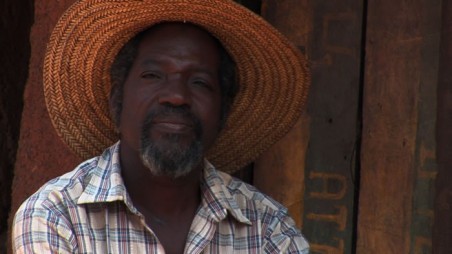Portrait - Séda

Born in Baga in October 1944 Séda Bawiena was only sent to school in 1958 after spending all of his childhood immersed in his family’s traditional and rural environment. Yet even while he was attending school he still tended to the traditional responsibilities of a male member of the family, juggling both school and agricultural work. While Séda was in fourth grade, Catechism classes were introduced at his school and quickly he got attracted to the new Catholic faith. In fact he attended sixth grade in the presbytery in Alejo near Baga after having converted to Catholicism without giving up completely on his family’s animist tradition. Initially he didn’t feel there was any antagonism between his traditional spiritual values and his new Catholic faith but when his bishop scolded his desire to become a farmer-priest, considering it an inappropriate vocation, Séda started second guessing his faith: “I told my bishop that I preferred farming and getting married”. He kept increasingly distancing himself from the Church over the years until he finally left it: “the Catholic religion stopped being what I had believed in: truth, transparency, real acts. It became nothing more than a ritual”.
Séda went to high school in the nation’s capital Lomé in the South of Togo. After getting his French Baccalaureat (end of school diploma) he went to Accra in neighbouring Ghana for a gap year. A large part of Togo’s promising youth had been emigrating to Accra in the hope of finding better economic opportunities, yet Séda was intent on sharing his passion for the village with them. He wanted to remind them that beyond the obvious challenges inherent to life in the village, there were also tremendous opportunities. “I went to tell them that our country, Togo and our villages had a meaning and that they should come back home.” He also went to Ghana to bring back Tiyéda, whom he had met a few years back. They will marry soon after.
Séda and Tiyéda headed back to Togo with plans to pursue their graduate studies in France on a scholarship. Séda went to business school, thinking of one day becoming a diplomat, but “agriculture was haunting me, in France I was miserable and I was desperately trying to regain my rural lifestyle.”
Inhabited by his love for agriculture and for the village, he passed on “well paid jobs” and moved back to his village Baga after working for a few months in an office in Lomé: “Every job offer I received didn’t excite me, for me the only thing that mattered was to go back to the village and work the fields.”
Thanks to the generosity of a group of friends in France he was able to lead the construction of the village’s first and only health clinic. Thus CIDAP was born. Séda started his project supported by his father who shouldered him during many years of isolation in the fields where they laid together CIDAP’s foundations. His return to the village nevertheless rubbed certain people the wrong way especially since he didn’t come from a wealthy, land-owning family and he didn’t have any international funding. “people couldn’t understand, how can this poor penniless black recent graduate do anything when he would be more useful living in the city making money to feed his family?” But armed with good will, lots of ideas and the support of his wife Tiyéda, he established the CIDAP which was initially only welcomed by the village’s widows who, seeing how hard he was working for the good of the community, took pity on him. “They were the spearheads of the project’s human capital. That’s how it all started, that’s how the empowerment of women started.”
After 25 years at the helm of the CIDAP, Séda has decided to retire in order to allow the next generation – the centre’s younger staff who have been training the local populations for 15 years – to take over and carry the project into its next phase.
I hope that this example of bottom-up development gives many governments pause for thought and also causes international agencies to rethink the ways they bestow benevolence
- Caroline Ash, Science magazine, Washington DC

